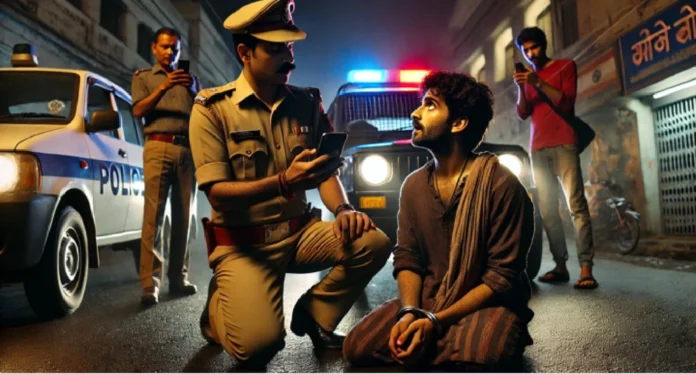By Binny Yadav
By upholding detainees’ right to be informed of the grounds of their arrest as “mandatory” rather than a mere formality, the Supreme Court has reaffirmed the fundamental right to personal liberty enshrined in the Constitution. The ruling strengthens the protections under Article 22(1) of the Constitution, which guarantees that every arrested person must be informed of the reasons for their detention.
A bench of Justices AS Oka and NK Singh, in an order dated February 7, 2025, stated: “Article 22 is included in Part III of the Constitution under the heading of Fundamental Rights.” However, a critical question remains: How will this judgment be enforced in practice?
The ruling is a landmark step towards protecting personal liberty, but its real impact depends on effective implementation. Given the historical failure of law enforcement agencies to adhere to such constitutional mandates, can we expect a real shift this time?
A Recurring Problem: Police Non-Compliance With Article 22(1)
Despite repeated Supreme Court rulings emphasizing the necessity of informing detainees of the grounds for their arrest, violations persist. Law enforcement agencies have long ignored this mandate, exploiting gaps in oversight, training, and accountability. This has resulted in the rights of citizens being routinely infringed upon, particularly for those who are unaware of their legal protections.
The Supreme Court’s latest decision highlights the urgent need for police compliance with constitutional safeguards and reaffirms that failure to inform detainees of their arrest grounds renders the arrest unlawful and unconstitutional.
Key Findings of The Judgment
The Supreme Court emphasized that:
- The right to be informed of the reasons for arrest is not just a procedural step, but an inviolable constitutional right.
- Failure to provide this information violates fundamental rights and renders an arrest illegal.
- This right extends beyond the detainee—their authorized family members must also be informed of the arrest.
This ruling offers much-needed relief to detainees and their families, ensuring transparency in arrests and reducing the risk of arbitrary detention.
Why Do Police Officers Ignore Article 22(1)?
Despite clear legal mandates, police officers frequently flout Article 22(1) for several reasons:
1. Ignorance of legal obligations
Many law enforcement officers lack proper training in constitutional law and fail to recognize the significance of informing detainees about their arrest grounds.
2. Lack of accountability and oversight
Weak enforcement mechanisms allow procedural lapses to go unpunished, leading to a culture of impunity among police officers.
3. Arbitrary detentions for convenience
Police sometimes bypass legal requirements to speed up investigations, using detentions as a tool to pressure suspects into confessions.
4. Overburdened police and judicial systems
Resource constraints and caseload pressures lead officers to prioritize efficiency over due process, often neglecting detainees’ rights.
5. Exploitation of vulnerable individuals
Many arrested individuals, particularly from marginalized communities, lack legal literacy and are unaware of their rights, making it easier for police to sidestep constitutional safeguards.
6. Inadequate training in human rights
Police academies rarely emphasize human rights education, resulting in poor awareness and frequent violations of constitutional provisions.
A Long History of Violations: Key Cases
Despite multiple Supreme Court rulings reinforcing the necessity of adhering to Article 22(1), police non-compliance continues. Several landmark cases illustrate the persistent failure to uphold detainees’ rights:
1. Khatri (II) vs State of Bihar (1981)
The Supreme Court ruled that law enforcement agencies have a constitutional duty to inform detainees of their arrest grounds. However, violations remain rampant even decades later.
2. Joginder Kumar vs State of Uttar Pradesh (1994)
The ruling reiterated that arresting authorities must provide immediate notification to the detainee and their family. Yet, enforcement remains inconsistent.
3. DK Basu vs State of West Bengal (1997)
The court issued strict procedural guidelines for police conduct during arrests, but many officers still bypass these rules.
4. Sunil Batra vs Delhi Administration (1978)
While primarily focused on prisoner rights, the ruling also underscored the necessity of informing detainees about their arrest reasons.
The Road Ahead: Can This Ruling Drive Change?
The Supreme Court’s latest decision offers a much-needed legal reinforcement of Article 22(1). However, real change depends on the ability of law enforcement agencies to internalize and implement this constitutional mandate. Several measures could improve compliance:
- Public awareness campaigns: Educating citizens about their rights under Article 22(1) will help hold law enforcement accountable.
- Mandatory police training: Regular constitutional law education should be integrated into police training programmes.
- Stronger oversight mechanisms: Independent watchdog agencies must ensure police officers are held accountable for violations.
- Legal repercussions for non-compliance: Strict disciplinary actions against officers who fail to inform detainees of their arrest grounds should be enforced.
Despite the clear legal protections under Article 22(1), the gap between law and enforcement remains wide. The question now is: Will this ruling finally be a turning point, or will it be yet another ignored directive in India’s long struggle for legal accountability?
—The writer is a New Delhi-based journalist, lawyer and trained mediator


